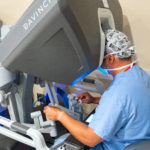“Do other women normally leak when they laugh?”
“I think my bladder is dropping!”
“I don’t think you can help me.”
“My aunt had this procedure done for her bladder 20 years ago, and it hasn’t been helpful.”
There is a lot of misinformation surrounding pelvic floor disorders. The good news is that modern medicine has created many treatments for common pelvic floor conditions, including medication, physical therapy, safe procedures and minimally invasive surgery. At the ChristianaCare Center for Urogynecology and Pelvic Reconstructive Surgery, we want to help you understand your options so you can get back to living your best life.
Click here for more on urogynecology and pelvic floor health and to schedule an appointment with a ChristianaCare provider.
Pelvic floor and why we should be talking about it
The pelvic floor is a group of muscles, ligaments and connective tissues that support the bottom of a woman’s pelvis. These pelvic floor is responsible for stabilization, continence and sexual function. These connective tissues and muscles can become weak or painful as we grow older, causing side effects that are disruptive to daily living.
It’s important to have a discussion about pelvic floor health because it involves under-discussed, underdiagnosed and undertreated conditions that are much more common for women as we age. All too often as a society, we normalize uncomfortable symptoms instead of seeking help for prolonged, painful conditions. There are ways to make each woman feel better and increase her quality of life.
Common conditions affecting the pelvic floor
- Urinary incontinence (lack of urine control).
- Overactive bladder (frequent and sudden urge to urinate).
- Pelvic organ prolapse (the dropping of pelvic organs like the bladder, uterus, etc.).
- Fecal incontinence (lack of control of stool).
- Urinary tract infection (commonly called a UTI).
- Interstitial cystitis (also known as painful bladder syndrome).
- Female sexual dysfunction (including Dyspareunia or pain during intercourse, involuntary spasms and lack of interest).
- Pelvic floor muscle dysfunction (often includes pain affecting pelvic floor muscles).
- Vulvodynia and vulvar vestibulitis (pain of the vaginal and/or vulvar tissues).
- Genital fistula (abnormal connection often between the vagina and bladder or vagina and bowel causing severe incontinence).
Why is pelvic floor health critical to women’s health?
Good pelvic floor health is critical to women’s health because it allows them to participate in the daily activities they enjoy without discomfort, fear of lack of urine control or painful side effects from pelvic floor disorders. For instance, urinary incontinence has been shown to be incredibly distressing to women. The stress from urinary incontinence may isolate women, causing issues from lack of socialization. There can be a sense of dissatisfaction and avoidance of once pleasurable activities like going to the gym, taking long car rides, and walking or hiking.
Pelvic floor condition diagnosis and treatment
We provide a wide variety of treatments and support for the diagnosis of pelvic floor conditions and treatment. Treatment varies widely depending on each patient’s needs and goals. For instance, urinary incontinence is different for each patient. One patient may only leak with vigorous exercise. Another patient may leak all day long with every cough, sneeze and movement they make. No amount of urinary incontinence is too small or too large for treatment.
Click here to schedule an appointment today!
Treatments we offer
- Education and support.
- Behavioral changes including strengthening the pelvic floor and retraining the bladder.
- Pelvic floor physical therapy with specialized therapists in the pelvic floor.
- Non-surgical treatments including medications.
- A wide range of procedures and minimally invasive surgery options.
- Minimally invasive surgery to treat stress urinary incontinence (a 30-minute surgery and then going home on the same day).
- Procedures to treat urge urinary incontinence such as Botox injections into the bladder or utilizing a neuro-modulating implantable device similar to spinal cord stimulators for pain.
- Reconstruction of the pelvic floor for pelvic organ prolapse using minimally invasive surgical techniques, such as vaginal and laparoscopic surgery as well as robotic surgery using da Vinci Robotic Surgery System.
“We perform approximately 1,000 surgeries annually to help women get back to living their best life.” – Emily Saks, M.D.
Pelvic Floor and Sexual Health Center
Within the ChristianaCare Center for Urogynecology and Pelvic Reconstructive Surgery Center, we also have a specialized center for pelvic floor and sexual health. Here, two of our providers focus exclusively on pain related to the pelvic floor, pain related to sexual intercourse and sexual dissatisfaction.
Center for Urogynecology and Pelvic Reconstructive Surgery
No matter how severe or mild your symptoms are, please seek help. At the ChristianaCare Center for Urogynecology and Pelvic Reconstructive Surgery, we see all patients with pelvic floor disorders and not just those patients wanting intervention or needing surgery. We partner with every woman to help her reach her goals. Our center has four advanced practice providers and four surgeons who are the only fellowship-trained urogynecology surgeons in the state of Delaware. We often work closely with gynecology and colorectal teams, and we help coordinate your care. Our mission is to help you feel strong and healthy enough to get back to the activities you enjoy. Schedule an appointment with us today.



